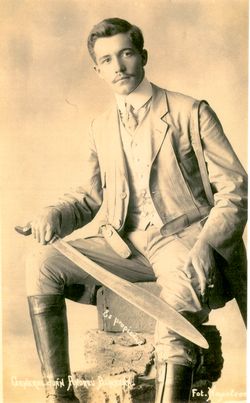La División Almazán
Juan Andreu Almazán was a serial revolutionary. In his memoirs, he said that in October 1916, as a division general defending the sovereignty of Oaxaca from his headquarters in Huajuapan de León, he established a customs system and issued paper money which became indispensable, “because only with our money could the people purchase all of the goods we took from the enemy and only with it could the merchants pay the import and export duties". During this time, he issued cardboard notes, well printed in denominations ranging from one to 100 pesos “uncounterfeitable notes that were signed by General Zuriaga and by General Almazán himself.””Memorias del General Juan Andreu Almazán”, El Universal, 16 April 1958.
However, the only note attributable to Almazán is a remaindered $1 División Almazán, dated 1 April 1916. As it is improbable that all these values have completely disappeared, it is likely that Almazán used Estado de Oaxaca issues or notes revalidated in accordance with José Inés Dávila’s decree no. 10.
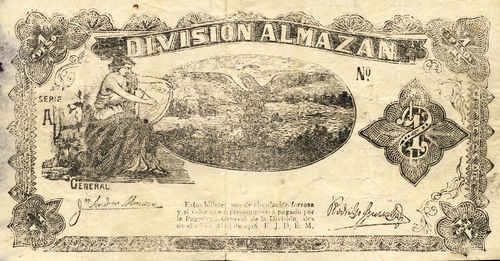
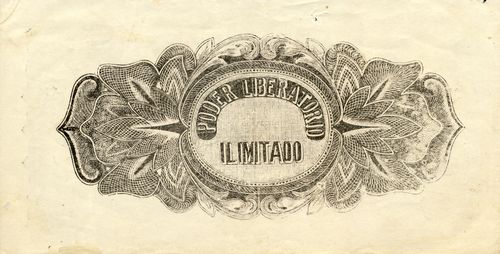
| series | from | to | total number |
total value |
||
| $1 | A |
The note has the printed signatures of Juan Andreu Almazán and Rodrigo Zuriaga Pineda.
|
In November 1911, almost immediately after Madero was elected president, Zapata broke with Madero and renewed his fight against the government of Mexico City. Juan Andreu Almazán sided with Zapata and joined the rebellion against Madero. When Madero was deposed in February 1913, Huerta put out peace feelers to all the rebel groups. Zapata had a great dislike for Huerta and refused to make peace. Andreu Almazán, however, did not share Zapata's feelings about Huerta, and elected to follow him. He was given a combat command, and thereafter became associated with Pascual Orozco, who had also joined Huerta. He and his forces fought against the forces of Pancho Villa. In the battle of Torreón, in late March 1914, Almazán commanded a brigade under General José Velasco. When Huerta was defeated in August 1914, Almazán and several other generals associated with Orozco, and known as "Colorados" (because of their red flag) moved south and joined forces with Zapata. Still, Zapata did not integrate them into his forces but allowed them to operate mainly in the state of Puebla. The high-water mark of Almazán’s military career came in December 1914, when his Colorado forces, supported by the forces of Zapata, forced the Carranza's Constitutionalist Army out of the city of Puebla, claiming it for the Liberation Army of the South, and the Government of the Convention. The glory was short-lived, however, because the following month, General Obregón’s Constitutionalist Army forced Almazán and the Colorados out of Puebla. Thereafter, Almazán continued to fight against Carranza and his government as a guerrilla faction. In the early summer of 1916 Félix Díaz returned to Mexico and called for the rebel forces of Mexico to join him in the fight against Carranza. As Zapata’s cause seemed to be failing, Almazán chose to align himself with Díaz. Throughout 1915, 1916 and 1917, Almazán operated in the area of Guerrero, Puebla and Oaxaca, primarily as an independent rebel force, yet putting out public pronouncements that he supported either Zapata or Díaz. In early 1918 Almazán changed his base of operations to northeast Mexico, as a rebel force supporting Felix Díaz. With the Agua Prieta revolt of 1920, Almazán supported the rebel forces that removed Carranza and established Obregón as President. For his support, Obregón’s government confirmed his rank as a general. In 1921 he was promoted to Division General, the highest rank in the army. During the 1920s he became director and principal stockholder of a road-building firm, and began investing his profits in industrial and real estate holdings in Monterrey, Mexico City and Acapulco. He was loyal to President Plutarco Calles, and as Communications Minister in Ortiz Rubio’s cabinet in the early 1930s, he enlarged his already considerable fortune by granting government concessions, such as the Pan American Highway construction job from Laredo to Mexico City, to his own company. During the Cárdenas administration, he acquired vast holdings in silver mines. By 1939 he had become one of Mexico’s wealthiest citizens and the next year stood for the Presidency. The 1940 elections were violent and irregular and many believe that Almazán was the real winner. Crying fraud, he left Mexico hoping to build support for an insurrection. When it became clear that little support for him existed, he gave up on the idea of a violent revolt. He returned to Mexico and attended the inauguration of Manuel Ávila Camacho. |
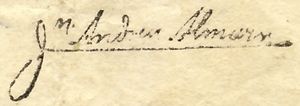 |
|
Rodrigo Zuriaga Pineda was born in Dolores Hidalgo, Guanajuato. He joined the army as a private soldier in 1903. He remained in the federal army until 1914. the year in which he joined the Revolution, as a Lieutenant Colonel in the forces of General Almazán, operating in the state of Puebla. In 1915 he was promoted to Colonel under the command of General Almazán, expanding his radius of action to the Federal District, Hidalgo, Puebla and Oaxaca. By 1918 he had received the rank of General de Brigada. On 3 March 1929, General José Gonzalo Escobar started a rebellion in northern Mexico against the government of Emilio Portes Gil, who had taken over the presidency after Obregón's assassination. Almazán, the commander in Monterrey, had been called to fight in Veracruz, leaving Zuriaga in his place. Escobar approached Monterrey with 30,000 men, whilst Zuriaga had only 125 troops. Escobar offered Zuriaga a chance to surrender, but was rebuffed with the phrase "puede usted empezar cuando guste (You can begin whenever you want)". Zuriaga was wounded in action and died on 4 March. |
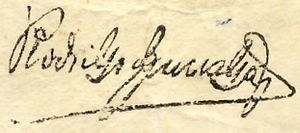 |
The legend states "Estos billetes son de circulación forzosa y el valor que representa sera pagado por la Pagaduría General de la División, desde el 1o de Abril de 1916. F. J. D. E. M."

